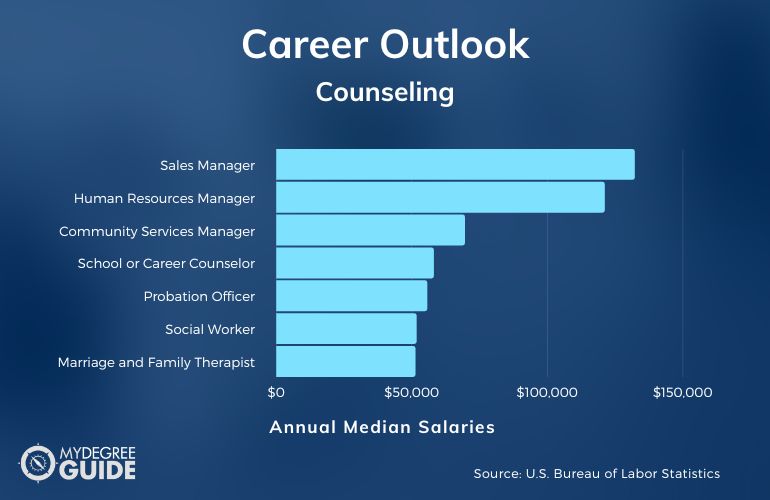What can you do with a Masters in Counseling degree? Earning this degree can help you become equipped to help people face their problems and improve their lives.

Editorial Listing ShortCode:
A traditional or online master’s program in counseling can help you gain valuable counseling skills with which you can make a real difference for others.
Masters in Counseling Programs Specializations
Select the program that most interests you to jump to that section of the guide:
- General Counseling
- Marriage and Family Therapy Counseling
- Mental Health Counseling
- Substance Abuse Counseling
Although there may be some crossover between counseling careers, there are some important distinctions to consider.
General Counseling

Getting a generalist master’s degree in counseling is a flexible degree that can help you go many different directions with your career. If you’re undecided on a particular job path, pursuing a program like this can give you the flexibility to explore various options during your time in school.
Another reason to consider this degree is if it’s the only one available at your school. Not all colleges offer specialized counseling master’s degree programs online or even on-campus. If you have your sights set on a particular school, don’t worry if they only offer a generalist degree.
After graduation, you should still have the necessary skills for working in private practices, social service agencies, residential facilities and elsewhere.
Editorial Listing ShortCode:
The curriculum for a general counseling program will likely include classes on counseling theories, family therapy, cultural diversity and substance abuse. You likely need to complete an internship or a practicum in which you can try out your skills in a supervised setting.
Marriage and Family Therapy Counseling

Family dynamics can be tricky. Sometimes people need help navigating these important relationships. If you’re interested in making a difference for couples, parents, children and siblings, then a degree in marriage and family therapy might be a good choice for you.
Marriage and family therapists often work in private practices and social service agencies. You might work one-on-one with individuals, hold sessions for whole families or run group programs in which people from various families can work through similar issues together.
With this degree, you might also work in a substance treatment center to help families affected by addiction.
Editorial Listing ShortCode:
Your coursework will likely include classes about counseling people throughout the lifespan; for example, you may discuss therapy techniques to use with children, adolescents and adults. Other courses may address group counseling, grief therapy, gender and sexuality issues, career counseling and addiction. Before graduation, you’ll probably need to complete an internship.Marriage and family counseling is a popular accelerated counseling degree option for those who want to graduate quicker than the average student.
Mental Health Counseling

Becoming a licensed counselor may be your goal. Titles vary from state to state; examples include licensed mental health counselor and licensed professional counselor. No matter which term your state uses, if this is your goal, it’s important to choose a licensure track for your master’s. A degree in mental health counseling may be the way to go about it.
Licensed counselors often see clients in private practice, whether in independent offices or shared clinics. Hospitals and faith-based organizations sometimes have counselors on staff. To provide mental health services for at-risk populations, you might look for a job with a social service organization, a correctional facility or a community center.
Editorial Listing ShortCode:
To prepare, you’ll need to study counseling theories and techniques. Because you’re likely to counsel people with mental health disorders, you’ll need to learn how to assess conditions, consider diagnoses and plan treatments. An internship will likely be an important part of your studies.
Substance Abuse Counseling

Although medication often plays a role in substance abuse treatment, counseling can be one of the most important components of an addicted person’s recovery plan.
If you desire to see people transform their lives and break free from addiction, then this master’s program may be for you. This career path often appeals to those who have struggled with substance abuse themselves.
Editorial Listing ShortCode:
Substance abuse counselors often work in inpatient or outpatient rehab facilities. You might also provide services in a transitional housing unit where people live after completing a rehab program. Another option is to work in a school or a community agency to run prevention programs and counsel addicted adolescents.
For this program, you’ll need to study how addiction affects the body and the mind. You may discuss working among diverse groups, advocating for societal change, helping people through crisis situations and running group therapies. The curriculum will likely include practicums or an internship.
10 Things You Can Do with a Counseling Degree
1. Mental Health Counselor

Mental health counselors help people process the struggles of life and find help with their mental health conditions. Some clients may have diagnosable mental health disorders. Others may need support to process grief, stress, transitions or relationships.
Conducting assessments is an important part of the job. By evaluating clients, counselors can work to identify mental health conditions. Then they can establish counseling treatment plans and may recommend that some clients seek medication.
Many mental health counselors work in private practice. Others offer their services through community agencies, corporations or hospitals.
2. Marriage and Family Therapist

To help people build strong, healthy relationships, think about a career in marriage and family therapy. Marriage and family therapists help families bring peace to their homes.
Some clients need to be seen individually, and others go to therapists’ offices as couples or parent-child sets. Under their therapists’ supervision, they can discuss problems at home and start to see things from the other’s point of view.
Editorial Listing ShortCode:
Some therapists provide these services in private practices, but some social service agencies also hire family counselors. In a drug rehab facility, therapists help families who are dealing with the effects of addiction.
3. Substance Abuse or Behavioral Disorder Counselor

Helping people manage addiction and learn to live without drugs and alcohol can be a challenging but rewarding career. You might be drawn to this field if you or a family member has experienced addiction and recovery.
In addition to working with people who have substance abuse disorders, counselors may also provide help with other addictive behaviors. These include gambling and eating disorders.
You might work as an addiction counselor in an inpatient or outpatient rehab facility. Social service agencies and halfway houses also hire for this role. Clients may come to see you in a private practice office.
4. Rehabilitation Counselor

Rehabilitation counselors have opportunities to support people with disabilities or impairments. This can be a fulfilling career opportunity for those who want to see people achieve their full potential and live independently
Some rehabilitation counselors work with people who have physical, mental or behavioral disabilities. Some also serve senior citizens with memory loss or physical limitations. Another option is supporting veterans who have PTSD after combat.
Editorial Listing ShortCode:
Long-term care facilities often need rehabilitation counselors. Community programs for youths, seniors or veterans may also have openings. Your roles might involve connecting clients to medical services, job opportunities and community supports.
5. Career Counselor

There’s nothing quite as satisfying as having a job that you love. If you want to help others find that satisfaction, then you might do well as a career counselor.
Career counselors help people evaluate their strengths and consider various jobs. This might involve administering aptitude tests and discussing work history. They might also help people write resumes, prepare for job interviews and solve workplace problems.
Career counselors sometimes work at colleges to help students shape their future plans. Some also help clients in social service agencies improve their employability or help professionals improve their resumes.
6. School Counselor

Counseling children often takes place in school settings. School counselors help kids with their social skills and their mental health.
Counselors help students succeed academically and socially. They talk to kids about their struggles, help teachers create supportive school environments, and dialogue with parents about their children’s needs. At the high school level, they help students make college and career plans.
School counselors work in elementary, middle and high schools. Both public and private schools can benefit from on-site counselors. You may need special training or state teaching licensure to do this job.
7. Social or Community Service Manager

Knowing how to relate to people and help them work through their problems can help you be an effective manager in a community or social services organization.
Managers in service organizations coordinate staff and oversee programs that provide necessary supports for individuals in need. For example, they might run career counseling programs for welfare recipients or drug-prevention programs for at-risk teens.
Editorial Listing ShortCode:
Social and community service managers typically work in nonprofit settings. Places hiring for this role may include community centers, medical clinics, faith-based organizations and residential facilities. Many jobs are with local or state government agencies.
8. Probation Officer

As criminal offenders change their behavior and learn to make different choices, they need support and guidance. Probation officers fill this important role.
Probation officers meet regularly with offenders on their caseloads. They may need to administer drug tests, provide mental health evaluations, visit homes and neighborhoods, serve as career advisors, and stay in touch with court officials. Keeping accurate records is an important part of your job.
Probation officers perform this job as part of the court and corrections system. They may work for the local or state government.
9. Human Resources Manager

Employees want to know that their employers care about them as individuals. You may be able to provide strong, compassionate, caring leadership for workers as a human resources manager.
Human resource managers help employers be their best, both professionally and personally. They use their counseling skills to settle workplace conflicts and disputes. They may also rely on their knowledge of human thought and behavior to head up training and professional development programs.
Human resources managers usually work in office settings. You might take this role in a midsize or large business, a government bureau, or another organization.
10. Sales Manager

For a non-traditional approach to using your counseling degree, consider pursuing a job as a sales manager. Your knowledge of relationships may help you build connections with clients and head up effective sales teams.
Getting products or services into customers’ hands is the main goal of a sales manager. By effectively overseeing a team of sales representatives, sales managers can expand their company’s reach. They also set goals and analyze trends to increase their team’s sales.
Editorial Listing ShortCode:
As a sales manager, you may work for a manufacturer, a wholesaler or a service provider. You might also hold a job in the retail sector.
Counseling Careers & Salaries

Counseling is a fast-growing field. The Bureau of Labor Statistics predicts that positions for substance abuse, behavioral and mental health counselors will rise 25% for the next ten years. Whether you’re just getting started in this field or have years of experience, your skills should be in demand by clients and employers.
Entry Level Counseling Jobs
Are you looking for a job that you can do while you earn a master’s degree in counseling? These entry-level positions in community and social services can help you get your foot in the door.
| Career | Annual Median Salary |
| Probation Officer | $55,690 |
| Social Worker | $51,760 |
| Social and Human Services Assistant | $35,960 |
As a social worker, you’ll be limited in the responsibilities that you can take on at this point in your training. For example, you may be able to serve as a case manager or perform administrative duties, but you won’t qualify as a licensed clinical social worker without a master’s degree.
Mid-Career Counseling Jobs

Once you earn a master’s degree in counseling, many more job opportunities in this field may be available to you.
| Careers | Annual Median Salary |
| Marriage and Family Therapist | $51,340 |
| Substance Abuse or Behavioral Health Counselor | $47,660 |
| Rehabilitation Counselor | $37,530 |
Keep in mind that licensure is required for many of these positions. Each state sets its own rules for licensing counselors, and the titles can vary from state to state as well. Before enrolling in a master’s program, it’s a good idea to confirm that the courses will satisfy your state’s requirements for the type of counseling you plan to do.
Highest Paying Counseling Jobs

Some of the highest salaries in counseling require extra certifications. For example, some states want all school counselors to hold a teaching license in addition to having a counseling degree. Other top-paying jobs for this degree aren’t in counseling at all. Rather, they’re positions that can benefit from the skills learned in a counseling program.
| Career | Annual Median Salary |
| Sales Manager | $132,290 |
| Human Resources Manager | $121,220 |
| Social or Community Services Manager | $69,600 |
| School or Career Counselor | $58,120 |
It’s worth noting that you don’t necessarily have to pick one of these top-paying jobs to earn a good salary with a master’s in counseling. Simply gaining experience and adding credentials to your resume may help you move beyond the median earnings in jobs like mental health counseling or family therapy.
How Much Do Counselors Make with a Masters Degree in Counseling?

Counseling salaries vary based on experience, line of work and area of the country. On average, though, those who work in substance abuse, behavioral disorders and mental health earn $47,660 each year (Bureau of Labor Statistics).
Editorial Listing ShortCode:
You might earn more as a marriage and family therapist, a school counselor or a community services manager.
Is a Masters in Mental Health Counseling Worth It?
Yes, a masters in mental health counseling is worth it for many students. The Bureau of Labor Statistics is projecting 12% job growth in community and social service occupations over the next 10 years. Common careers in this field include social worker, marriage and family therapist, rehabilitation counselor, and school or career counselor.
Almost every licensed counseling job requires a master’s degree. Getting a graduate education is worth it to many because helping others transform their lives is a job that proves rewarding again and again.
You’ll likely be able to look back and remember many times that your counseling truly made a difference for others.
Can You Be a Therapist With a Masters in Counseling?

The terms “therapist” and “counselor” are often used interchangeably, and you may be qualified to perform certain types of therapy after getting a counseling master’s degree. For example, you might become a marriage and family therapist.
With additional training, you might be ready for Behavior Analyst Certification and a career in behavioral therapy.
What Can I Do With a Masters in Clinical Mental Health Counseling?
As a clinical mental health counselor, you may provide assessment and treatment for people who have mental or behavioral health disorders. You may also assist others who are having a hard time with the stresses of life.
Places of employment include private practices, health clinics, hospitals, social service agencies, residential facilities, outpatient centers and universities.
What Can You Do with a Master’s in Counseling?

With a Master’s in Counseling, you can help people improve their lives. You might restore relationships as a marriage therapist, provide lifesaving intervention as a substance abuse counselor or increase job satisfaction as a human resources manager.
Whichever path you choose, your work may make a real difference for the people around you. To get started with this fulfilling calling, submit applications to counseling master’s programs.

